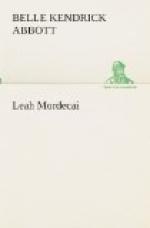“I did not promise her, though, to leave off loving Leah Mordecai. I did not tell her, either, that I had asked Leah to be my wife one of these days, when school-days were ended.
“June 5.—The closing exercises of the schools have been hurried up this year, as the weather is exceedingly warm, and the Board of Health fear a return of the terrible scourge, yellow fever, that so devastated this fair city five years ago. Next week, Madam Truxton’s seminary closes, and that is one week before the institute does. Invitations to Madam’s levee are already out. The graduating class of cadets are invited—lucky fellows!
“Helen seems really sad at the prospect of parting with her school-days and her friends. But then she is eighteen, and that’s quite old enough for a girl to come out. She says, too, that of all the girls at school, Lizzie Heartwell will be the most regretted when she leaves the Queen City for her home in a distant State. She is quite a pretty girl, but too religious, I should judge, from what Helen says. Her mother is a widow. I guess they are poor.
“Mother is quite reconciled to me again, and spoke playfully to me last night about marrying Miss Belle Upton, who is to visit Helen next week and attend the closing of Madam Truxton’s school. Well, ‘we shall see what we shall see,’ but I hardly think I will. She can hardly eclipse ’Leah Mordecai the beautiful,’—that’s the way I write it now.”
CHAPTER IX.
The examination-days at Madam Truxton’s were over. The long-dreaded reviews had been passed with credit to both pupils and instructors. The certificates of scholarship, and the “rewards of merit,” had been given to the fortunate competitors; the long-coveted diplomas awarded to the expectant “finishing class,” and that memorable term of school life was closed forever. The hour for the event had come. The grand old drawing-rooms above the assembly hall in the spacious building were filled to repletion—filled with the patrons and select guests that were honored with the fastidious Madam’s courtesy. It was an elegant assembly, one characteristic of the Queen City in her days of unostentatious aristocracy, of gentle-bred men and women.
Conspicuous among the famed guests were the three-score cadets, themselves just ready to emerge from college walls and step forth with triumphant tread upon life’s broad opening field.
The “finishing class” numbered more than a score of girls—all young, some gifted, many beautiful—whose homes were scattered far and wide through the country; young girls who, for many months, and even years, had lived and studied and loved together, with all the ardor and strength of youth. Now they were to be sundered; sundered with no prospect of future reunion.
All felt this approaching separation with more or less sorrow, according to their varying natures; and some contemplated it with deep regret.




